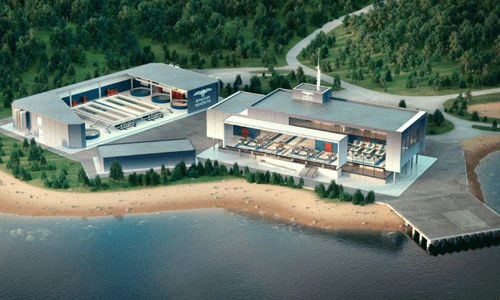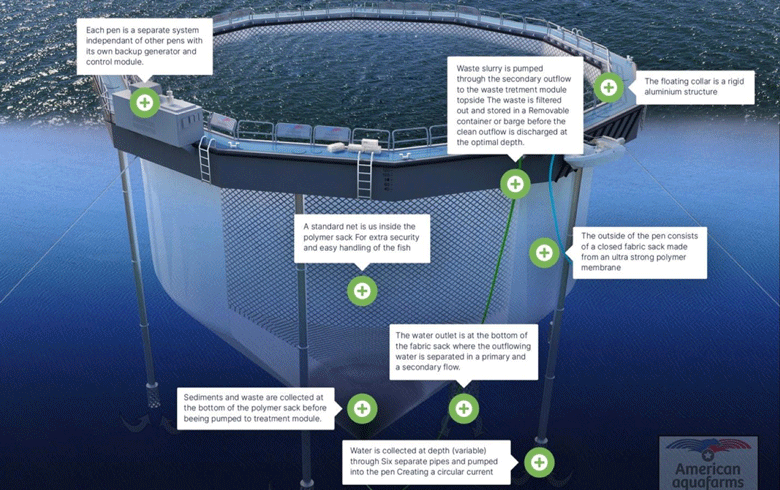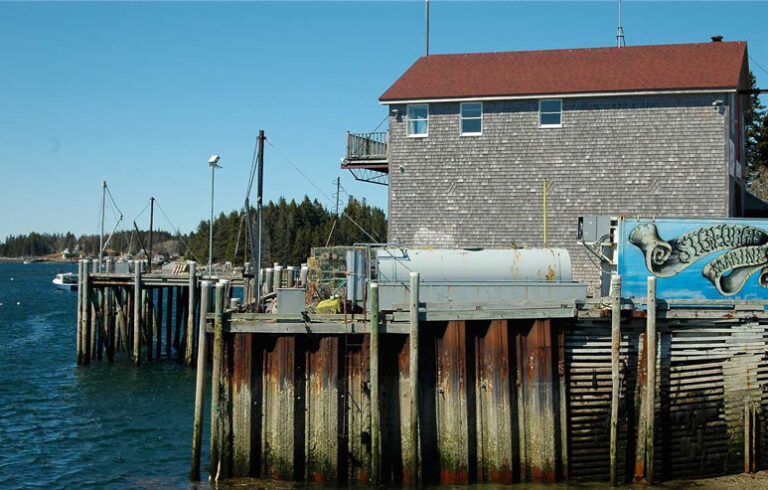A proposal by a Norwegian firm to install a large salmon farm in Frenchman Bay is drawing fire from a range of local stakeholders.
American Aquafarms was launched in Portland last year by Mikael Rones, CEO of Global AS, which is based in Trondheim, Norway. The firm submitted applications earlier this year to the Department of Marine Resources to lease two 60-acre sites in order to install 15 “closed net” pens and an operations barge at each. The pens and barge would account for about 10 acres of each lease, with the mooring field taking up the rest of the space.
The goal is to grow 66 million pounds of Atlantic salmon per year.

According to the applications, closed pen systems have been developed and used for 30 to 40 years in Norway, have become more commonplace in the last five to six years, and represent the “next generation” of fish farms, the application says.
The company projected it would take 20 months after the first pen is in operation for the facility to reach full production. The salmon would be processed on land at the former Maine Fair Trade Lobster facility in Gouldsboro. American has an option to buy that property.
Total investment is estimated at about $300 million.
Norway is the world’s leading producer and exporter of salmon. Company representatives have said they chose Maine as their location for its ideal ocean conditions and proximity to the U.S. market.
The project would be located just 2,000 feet from Acadia National Park at its closest point.
But there’s a growing outcry from local interests. Twenty-six Bar Harbor fishermen signed a statement opposing the proposal. Their concerns included the potential for “loss of prime fishing ground for lobster, scallops and shrimp,” increased fishing pressure on grounds adjacent to the proposed operation, loss of gear from service vessels and related support activity, navigational conflicts, water pollution related to discharge, feed and fuel spills, habitat impacts, and disturbance to the ocean bottom around the pens.
In addition, the statement said, the proposal could lower “the potential for a comeback to the historical fisheries of the bay, including the recent shrimping fishery that centered inside the bay on these two deep water holes.”
It also cited an “unwanted disruption to our way of life and to the environment that we work in.”
In a separate statement, Kathleen Rybarz, president of Friends of Frenchman Bay, said her group is opposed to the project.
“One cannot overstate the destructive impact of this large-scale proposal on a bay that already strives to balance multiple fisheries, heavy recreational use, cruise ship visitors and increasing ocean warming,” she said.
At a virtual meeting in June, the Bar Harbor Town Council voted to request intervener status on the application.
“People are starting to feel more and more strongly about whether we would like this to occur in Frenchman Bay or not,” said the council’s chairman, Jeff Dobbs.
About a dozen people spoke against the project at the DMR’s virtual informational meeting.
In his written statement to DMR, Acadia National Park Superintendent Kevin Schneider noted the project would be located just 2,000 feet from Acadia National Park at its closest point.
“While many other commercial fishing and aquaculture activities take place within Frenchman Bay, and exist in harmony with Acadia National Park, this development is totally different than existing aquaculture activities near the park,” Schneider wrote. “The scale of this development—the equivalent of 16 football fields—is unprecedented in Maine and incongruous with the existing nature and setting of Frenchman Bay and its surrounding lands.”
Eirik Jors, the company’s vice president, said aquaculture has been developed in Norway off similar coastal areas populated by small communities that have “embraced and adapted to the introduction of aquaculture as a part of the environment.” He said the pen technology has several layers of redundancy that minimize environmental risk.
A group called Frenchman Bay United sent a letter to U.S. Department of Interior Secretary Deb Haaland asking for her help.
“Unfortunately, Maine’s current rules and regulations offer inadequate protection against a large-scale industrial aquaculture project like this and disenfranchise many stakeholders around the bay from having a meaningful say in the consideration of permit applications,” the letter said.
The letter called for the U.S. Army Corps of Engineers, the only federal permitting authority for the project, to conduct a comprehensive Environmental Impact Statement under the terms of the National Environmental Policy Act..





